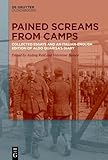Pained Screams from Camps : Collected Essays and an Italian-English Edition of Aldo Quarisa’s Diary / ed. by Aisling Reid, Valentina Surace.
Material type: TextPublisher: Mnchen ; Wien : De Gruyter Oldenbourg, [2024]Copyright date: 2024Description: 1 online resource (XIV, 324 p.)Content type:
TextPublisher: Mnchen ; Wien : De Gruyter Oldenbourg, [2024]Copyright date: 2024Description: 1 online resource (XIV, 324 p.)Content type: - 9783111296203
- 9783111298450
- 9783111297149
- 940
- online - DeGruyter
- Issued also in print.
| Item type | Current library | Call number | URL | Status | Notes | Barcode | |
|---|---|---|---|---|---|---|---|
 eBook
eBook
|
Biblioteca "Angelicum" Pont. Univ. S.Tommaso d'Aquino Nuvola online | online - DeGruyter (Browse shelf(Opens below)) | Online access | Not for loan (Accesso limitato) | Accesso per gli utenti autorizzati / Access for authorized users | (dgr)9783111297149 |
Frontmatter -- Contents -- The Human Condition of Exception: Collected Essays -- Words Behind Bars: Philosophy, Literature and the Experience of Detention -- The Scream as a Universal Language of Pain -- I confini dell’umano: il laboratorio di Auschwitz -- Agamben e il campo come paradigma biopolitico -- Testimoniare l’intestimoniabile: l’aporia di Auschwitz -- “To Restitute a New Privilege to the Inner Life”: Emmanuel Levinas and the Experience of Captivity -- Pain is Without Why: The (Non)Sense of Suffering After the Shoah -- Prisoners’ Rebellion Against the Silence of God: André Neher and Elie Wiesel -- “Suonare per vivere”: la musica utopica nei campi -- The Soundtrack of Extermination -- Pensare il campo di sterminio a partire da Per la critica della violenza di Benjamin -- “‘Is it Life?’ [. . .] ‘I Would Rather Be Without it’”: Flann O’Brien and the Fictive State of Exception -- Lost at Sea: Internment on the Argenta Prison Ship 1922–1925 -- Transforming Narratives: Unveiling the Detained Voice -- Contributors and Editors -- Aldo Quarisa’s Diary: An Italian-English Edition -- Dedication -- Acknowledgements -- Prefazione -- Preface -- Signals of Survival: Radio Technology and Communication in WWII Camps -- Hungry as a Prisoner -- Diario -- Diary -- Index
restricted access online access with authorization star
http://purl.org/coar/access_right/c_16ec
Detention camps exceed the juridical concept of punishment and crime. This book comprises two parts: 1. a collected volume that discusses camps not as something of the past, but as a paradigmatic political space in which ordinary law is completely suspended, and 2. an Italian-English parallel text of the war diary of an Italian prisoner during his confinement at the Stalag X-B internment camp near Sandbostel from 1943–1945. 1. The Human Condition of Exception: Collected EssaysEdited by Aisling Reid and Valentina Surace Written in Italian and English, the essays collected in this volume explore the issue of camps and suffering from various perspectives, including philosophical inquiry, literary analysis, historical description and legal assessment.As Agamben suggests, the camp embodies the state of exception. A dehumanising camp life will therefore emerge every time such a structure is created. What happens in camps exceeds the juridical concept of punishment, as well as that of crime. Prisoners are faced with a ‘useless’ pain (Levinas) as it is not the expiation of a fault. Prisoners attempt to describe their extreme suffering through their diaries. Their experience, however, cannot be entirely communicated. Even their screams, which express humanity at the extreme limit of its un-power, are silenced. Given the recent popularity of right-wing politics, as well as the centenary of Mussolini’s march on Rome, such research is more urgent than ever. The book will appeal to readers with an interest in philosophy as well as Irish history scholars studying internment during Partition and The Troubles in Northern Ireland. 2. Aldo Quarisa’s Diary: An Italian-English EditionEdited by Aisling Reid and Valentina Surace. Transcribed and with a preface by Galileo Sartor. Translation of the diary by Aisling Reid (Italian-English). In 1943, Aldo Quarisa worked at a military school in Florence, where he taught literature. In October of that year, one month after Italy had surrendered to the Allied forces, the Italians declared war on the Germans. In Florence, the German occupiers responded quickly, by arresting and deporting people with military connections to numerous concentration camps in Austria. Quite suddenly, Aldo was detained and deported through a network of camps, including Benjaminovo and the Stalag X-B internment camp, near the German village of Sandbostel. For two years, he found himself imprisoned alongside other Italians, including the celebrated journalist Giovannino Guareschi, who secretly kept a diary that was later published as his Diario Clandestino 1943–1945 in 1946. Much like Guareschi, Aldo also kept a diary and excerpts are published here in both Italian and English for the first time. The diary describes in unprecedented detail the monotony of camp life, the cruelty of the guards and the prisoners’ struggle to survive. The text is an important document that preserves the memory and voices of all those who suffered during the war and will inevitably be of interest to readers with an interest in World War II.
Issued also in print.
Mode of access: Internet via World Wide Web.
In English.
Description based on online resource; title from PDF title page (publisher's Web site, viewed 20. Nov 2024)


